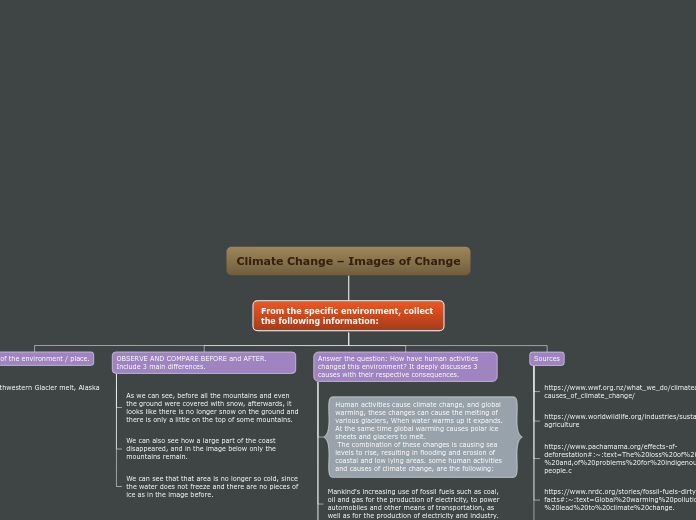Climate Change – Images of Change
From the specific environment, collect the following information:
Name of the environment / place.
Northwestern Glacier melt, Alaska
OBSERVE AND COMPARE BEFORE and AFTER. Include 3 main differences.
As we can see, before all the mountains and even the ground were covered with snow, afterwards, it looks like there is no longer snow on the ground and there is only a little on the top of some mountains.
We can also see how a large part of the coast disappeared, and in the image below only the mountains remain.
We can see that that area is no longer so cold, since the water does not freeze and there are no pieces of ice as in the image before.
Answer the question: How have human activities changed this environment? It deeply discusses 3 causes with their respective consequences.
Human activities cause climate change, and global warming, these changes can cause the melting of various glaciers, When water warms up it expands. At the same time global warming causes polar ice sheets and glaciers to melt.
The combination of these changes is causing sea levels to rise, resulting in flooding and erosion of coastal and low lying areas. some human activities and causes of climate change, are the following:
Mankind's increasing use of fossil fuels such as coal, oil and gas for the production of electricity, to power automobiles and other means of transportation, as well as for the production of electricity and industry.
Fossil fuels cause environmentally harmful compounds to form in the atmosphere, reduce ozone levels, and therefore increase the rate of skin cancer. Burning coal releases sulfur oxide, while burning car engines and power plants releases nitrogen oxides, which cause smog.
Deforestation because living trees absorb and store carbon dioxide.
The loss of trees and other plants can lead to climate change, desertification, soil erosion, fewer crops, floods, increased greenhouse gases in the atmosphere, and a myriad of problems for people. Indigenous villages.
An increasingly intensive agriculture that emits greenhouse gases such as methane and nitrous oxide.
Contamination. Agriculture is the main source of pollution in many countries. Pesticides, fertilizers, and other toxic agricultural chemicals can poison fresh water, marine ecosystems, air, and soil. They can also stay in the environment for generations.
Sources
